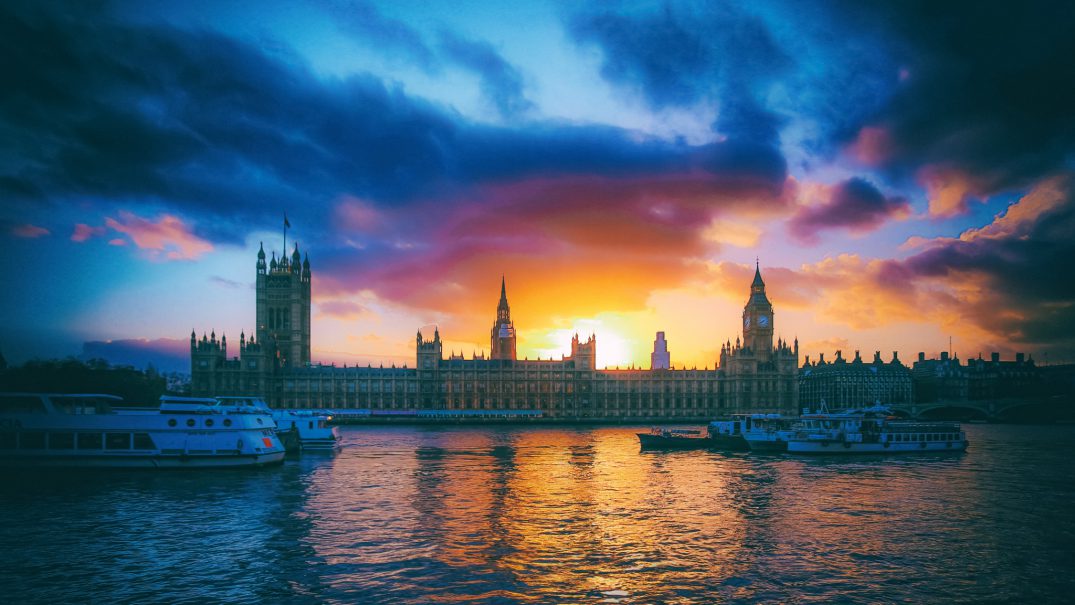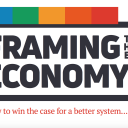Economic policy and strategy for a Corbyn-led government: reflections on Paul Mason’s Clement Attlee Memorial Lecture

Dying Of The Sun New Version by Simon & His Camera (Parliament & Westminster). Simon & His Camera / Flickr. Some rights reserved.
Just over two weeks ago I went to Paul Mason’s Clement Attlee Memorial Lecture, on ‘The Radical Left in Power — Challenges for Labour in Government’.[i] The lecture theatre was full. I stood in a corridor leading from the lecture theatre to the lobby, and even that corridor was full. It’s clear that Mason — author of Postcapitalism: A Guide to our Future — is one of the most important, and sought after, thinkers working on the present and future of the British Left (perhaps alongside Owen Jones, Mariana Mazzucato, Gary Younge, and Jeremy Gilbert).
But I left the lecture, an hour later, feeling a little empty. I didn’t feel like I’d heard an inspiring vision for what was possible under a Corbyn-led government, or a convincing account of how Corbyn and co. might address inevitable challenges. Mason fell back on tired, technocratic language: the language of “resilience”, “innovation”, and “human capital”. Even he seemed to realise that “human capital” was an ugly phrase, wincing and acknowledging this the second time he used it. When he spoke about what the new Corbyn paradigm would be, he said it would be a mixture — some arrangement of “state, market, and non-market”. But he did not say what this mixture or arrangement might look like. And though the lecture was meant to be about the general “challenges for Labour in government”, the focus was on economic policy, hived off from questions of foreign policy or race or justice, for example.
What the lecture did help me realise is that we are all — or at least all of us engaged with progressive politics in the United Kingdom, all with some hopes for a Corbyn-led Labour government — wrestling with what needs to be done on the British Left, how that is to be done, and who decides. And, as Paul Mason eloquently argued, we all need to direct our intellectual energies to these dilemmas, especially those of us with the privilege of having time to think about them.
So, coming out of this realisation and Mason’s encouragement, here’s my attempt to sharpen some of the questions I think those that identify as being part of the British Left need to grapple with — along with some suggestions about further work that needs to be done to get to some answers. I discuss questions in the realm of economic policy in particular, building off Paul Mason’s prompt, though I try to say something about how economic policy is connected to other parts of policy and politics. Others — especially people at the New Economics Foundation, Novara Media, Momentum, and in local Labour branches around the country — have contributed to sharpening these questions. I tweeted about at some of them a week ago. This is my effort to articulate my thoughts in a more elaborated, considered form, and to say a bit more in closing about the strategy for taking these ideas forward.
I write this all as a supporter of the Corbyn project, who is nonetheless open to criticisms of that project that need to be addressed; as a non-economist, who has a basic grasp of economics and an interest in new economic thinking; and as a critic of neoliberalism, hungry — like others are — for a different dominant political paradigm that better meets the needs of our time.
1. What kind of State will a Corbyn-led Labour government build?
If the 2017 election manifesto and the policy discussed since then is anything to go by, a Corbyn economic paradigm is not just going to be any haphazard arrangement of market, State, and non-State — and will involve a rejuvenated role for the State. That is clear from the proposal to nationalise the railways and from the proposal (to borrow the words of Tony Atkinson) to restore more progressive rates of taxation, amongst other things.
This role for the State needs to be articulated coherently. To justify this expanded vision of State action, Shadow Chancellor John McDonnell and others need to speak about why the State can be better at the market in carrying out key economic tasks: for example, the State can borrow more cheaply than the private sector, the State can achieve economies of scale, and the State can coordinate activity across different civil service departments. They need to speak about what they want the State to do — which might include a more expansive industrial policy, of the kind Mariana Mazzucato has alluded to.
But they also need to show how this State will address the shortcomings of the post-Second World War State. The State of the Attlee-Beveridge-Bevan era secured major achievements such as the establishment of the NHS, but it was also dominated by white men in positions of leadership and top-down.
No one in the Corbyn camp is talking about a return to that kind of State; one of the Tories’ easy attack-lines has been that a Corbyn government would take Britain back to the ’70s, or earlier. However, more needs to be done to show how newly nationalised services — like the railways — can be run in a bottom-up way.
What is the role for co-operatives in public services? Can new legal forms and structures support a different form of public ownership? And what place do trade unions have in all of this? Some answers to these questions are offered in outline in Andrew Cumbers’ interesting report for the Labour Party on different models of public ownership: he writes about the need to improve co-operatives’ access to finance, more democratic accountability on the boards of newly nationalised services, and the role of municipal public ownership. Jeremy Gilbert has also pointed to the two strands of Corbynism that pull apart from each other — one top-down and focused on Jeremy Corbyn, the other bottom-up and emphasising mass movement politics — and highlighted the need for the Labour Party to be clarify this tension. The organisation We Own It has been communicating in an accessible way the value of this new public ownership.[ii]
Thinkers and campaigners could usefully dedicate their energy, in the way called for by Paul Mason, to this sort of work: setting out the kind of State the Labour Party wants to build, explaining how this State interacts with and supports the community, and being specific about the policies that will realise that kind of State. (I say more below about how thinkers and campaigners can work together on this.) All of this is essential to building a new framework of thought beyond neoliberalism.
2. What is that State working towards?
A rejuvenated State, however, is not an end in itself. It is not the answer to our problems. It is a means to an end: a tool that can be used to build a better society. The harder task is spelling out what that better society looks like.
This was also a gap in Paul Mason’s Clement Attlee Memorial Lecture. Mason spoke of reclaiming social mobility as an ideal, and referred in moving terms to his father. But an important question remained unanswered when Mason mentioned social mobility: mobility towards what? Across the twentieth century, particularly in the United States in the context of discussions of the American Dream, social mobility was hailed as a sign of a successful society. However, references to social mobility were all too often silent about where mobility was leading, allowing a basic truth to remain unuttered: that many proponents of social mobility simply sought access to wealth for all. Is that what we should be focused on, in progressive politics today?
Of course, some answers are close to hand, and were implicit in Mason’s talk. Social mobility is about ensuring that class positioning, or other forms of oppression, do not dictate the shape of a person’s life. Social mobility means that people are not held back. It means that people have access to the opportunities that those born into privilege take for granted: opportunities to be educated, to find meaningful employment, to lead lives of security, to draw on the bonds of community in order to become individuals.
Yet we could still do more to state — in language that is fresh — what the goals of social mobility, and the State, are. If the State is transitional, as Gramsci says, we need to know the next step in that transition. Paul Mason spoke of radical social democracy, a theme he has continued to explore in his public writing. That concept could be unpacked further; I have also written about a new ideal of public democracy,[iii] since I think the limitations of social democracy have been well laid out, including by Joseph M. Schwartz and Bhaskar Sunkara.
The need to avoid stale terminology has led me, in the past, to write about love as the object of politics: not a banal love, a love that collapses into generalised and directionless niceness, but a deep sense of warmth that is directed towards others — a love that might motivate anger and conflict just as much as it motivates goodwill and generosity. Others will disagree with love being identified as the end-point of economic policy, and a progressive policy platform more generally.
What is clear, though, is that some sense of direction can help to mobilise people to take action. For as historian Robin Kelley has said: “Without new visions we don’t know what to build, only what to knock down.”
3. How will Corbynomics be integrated into a broader policy platform?
Paul Mason’s talk was not only disappointing because it narrowed a discussion of ‘The Radical Left in Power’ to an analysis of economic policy. It also disappointed because Mason, from that hemmed-in starting point, took a limited view of what economic policy is.
I think in the last twenty or thirty years ‘the economy’ has been viewed in more and more blinkered and technocratic terms. It has become regarded as a collection of numbers: the central bank’s interest rate, the level of growth over the past quarter, the inflation rate, the unemployment rate. (Nancy Fraser has hinted at this shift over time in an illuminating recent talk with David Harvey for Verso Books, available online.) But the choice to make the economy about these metrics, over others, involves value judgments. And the economy has always been about more than the sum total of a set of statistics covering inflation, interest rates, growth, and unemployment (as important as some of these might be).
Therefore a vision of economic policy under Corbyn needs to be connected to other features of the Labour policy agenda. One of the attractions of the current Labour Party is that it has attempted to integrate analysis of race and class (at a time when thinkers such as Keaanga-Yamahtta Taylor are working through similar issues in the States). But how will anti-racism and class consciousness — as well as a willingness to reckon with colonial pasts — feed into economic policy? Momentum has done fantastic work building progressive political energy amongst young people in the United Kingdom. How will economic policy deal with the problems faced by young people across the country, especially debt, and draw on their organising skills? The environment must also be a part of this debate. Can a government still follow the traditional Keynesian prescription — pumping money into an economy to boost aggregate demand — at times of crisis if that boost simply means greater consumption, and a contribution to global warming? Is that old Keynesian model appropriate, too, given the globalised structure of the British economy, and the likelihood that this increased spending might leak offshore rather than revive British aggregate demand? All of these questions must be explored if an economic policy is to be consistent with a broader Left agenda, and if a (justifiably) wide view is taken of what ‘the economy’ is today.
***
There is more and more talk of the need for progressive strategy in the US and the UK, as we see a resurgence of interest in radical politics — and as a Corbyn government appears to be within reach. Bhaskar Sunkara, founding editor of Jacobin, recently set up Catalyst, a journal of “socialist theory and strategy” (my emphasis). I heard discussion of this at an interesting recent talk by Madeleine Davis of Queen Mary University, London, called ‘Problems of Socialist Strategy Redux’. By ‘strategy’ I think what is meant is the coordination of different actions that are needed to bring about a better future.
But one final question is: whose responsibility is it to develop strategy, and to answer some of the questions laid out above? How should responsibility be divided between people like Paul Mason, who have done hard thinking about future economic and political challenges, and others doing work on the ground to organise campaigns?
Michael Hardt and Antonio Negri have offered the promising suggestion that in contemporary activism there is a need to flip the usual roles given to leaders and the rest of the mass movement: instead of leaders dictating strategy and the mass movement implementing tactics, the mass movement should dictate strategy — with logistics and tactics left to leadership. That is the approach already taken by many activist and campaigning groups. It is discussed in this conversation between Michael Hardt and James Foster from Novara Media.
This is, in one sense, the bottom-up model of change that is meant to underlie the Labour Party: remits are proposed by members, with the leaders having the responsibility to carry out the action taken to turn remits into policy and law. But for some time, in the United Kingdom and overseas, the ability of the mass movement to shape change within social democratic parties has become stunted. Work needs to continue to make membership of the Labour Party in the United Kingdom more meaningful, including through reform of internal processes. (Max Shanly’s note on strengthening Young Labour offers some ideas of reform in one part of the party.)
It may be that Hardt and Negri’s suggestion also leaves leaders of a social movement only doing administration — and that this is too technocratic. Whilst there does in my view need to be greater power given to members of a mass movement, leaders — as Jeremy Corbyn has demonstrated — may play some useful role in charismatically giving voice to ideas emerging out of the movement.
What is the role of intellectuals in all of this? We might need to challenge old dichotomies here, too: in particular, the distinction between intellectuals and non-intellectuals. it is important to remember that ‘intellectuals’ are not the same as ‘university academics’ — and by intellectuals I mean something broader than university academics (without at all demeaning the work of those academics).
Everyone is capable of doing intellectual work. There are different forms of intelligence — analytical, emotional, cultural, social, and practical intelligence. (Each of these forms of intelligence also comprises different parts: analytical intelligence, for example, might mean a comfort with abstraction, a skill for drawing distinctions, an ability to foresee and combat counter-arguments, or a combination of these things.) As Gramsci wrote in his ‘Prison Notebooks’:[iv]
“There is no human activity from which every form of intellectual participation can be excluded: homo faber cannot be separated from homo sapiens. Each [person], finally, outside their professional activity, carries on some form of intellectual activity, that is, [they are] a “philosopher”, an artist, a [person] of taste, [they participate] in a particular conception of the world, [have] a conscious line of moral conduct, and therefore [contribute] to sustain a conception of the world or to modify it, that is, to bring into being new modes of thought.”
In short: we’re all intellectuals. Some people have the privilege of being paid for intellectual work, including those at universities (though their pay and work conditions are not always as good as they should be, as the upcoming University and College Union strike highlights) — and those people can, where possible, use the time they have to work through these challenges. Others, including those who write for a public audience, may have a skill in finding words that speak to people’s instincts and intuitions, and if they can use this skill for the purpose of advancing a broader movement, that is all for the good.
But then the intellectual work that feeds into strategy — the work that clarifies what actions need to be taken — must be combined with practical work: coming up with a sequence of those actions (something Paul Mason alluded to in his Clement Attlee Memorial Lecture), thinking through what is possible (while always pushing to widen the existing Overton window, in the spirit of what Mark Fisher discusses in Capitalist Realism), and organising people to make the action happen.
A division of labour — tailored to the task ahead — can help to clarify the different forms of intellectual work that must be done, the practical work that can discipline that intellectual work, and the way that mixed intellectual-practical labour adds up to a strategy. (After all, as Marx notes in volume 1 of Capital, division of labour is not necessarily a capitalist idea: it is rather the case that a capitalist conception of division of labour has been developed that distorts our proper place in the world.) That division of labour will emerge out of the fierce furnace of activism, and in calmer moments of community-building and conversation.
In sum, then, the work of developing the strategy — to accompany the theory — of Corbynism is partly intellectual and partly practical. The responsibility of developing that strategy lies with all of us.
[i] Some of this lecture has been reproduced in this piece for openDemocracy: http://neweconomics.opendemocracy.net/neoliberalism-destroyed-social-mobility-together-must-rebuild/. (Paul Mason was not, however, wedded to his notes in his Clement Attlee Memorial Lecture, and there are sections in this openDemocracy that did not appear in his lecture.)
[ii] I sit on the Board of We Own It.
[iii] I have written about this in my book, The New Zealand Project, and in this piece about street art: https://thedial.co/articles/graffiti-politics-on-street-art-space-and-public-democracy.
[iv] My particular thanks to Franck Magennis for his comments on this section, and his suggestion of this quote from Gramsci.






